Vinegar has been around for thousands of years, and it’s been used medicinally for likely just as long. We've all heard the “wives tales” about what vinegar can do (and seen the crazy claims on the internet). But does it really work? Vinegar has been researched for a while now, so luckily we do have some evidence of its potential health benefits.
Studies have shown that vinegar can lower blood pressure, improve cholesterol, improve blood glucose levels, increase satiety and help with weight loss. Some of these studies are done in test tubes (in vitro) or in rats, so it’s hard to say if it would have the same effect in us humans, or what the “effective dose” would actually be. However, most human studies involving vinegar are around its ability to improve blood glucose, which is great considering almost 30 million people in the U.S. alone have diabetes (CDC).
Let’s take a look at the benefits of vinegar:
Antimicrobial Effects
Vinegar is one of the best natural cleaning agents due to its powerful antimicrobial actions. Check out some easy recipes to make your own cleaning products. Some studies have found that it is effective against E.coli and Salmonella (especially when mixed with lemon juice)!
Antioxidant
Many of the benefits we might get by consuming vinegar are due to its high antioxidant content. Certain vinegars have higher concentrations of antioxidants. For example, the Grape Wine vinegars have higher antioxidant content than apple cider vinegars. Unfiltered vinegars with “mother” have the highest levels of antioxidants.
Anti-Glycemic Effects
For years many studies have shown that vinegar can have numerous benefits for our insulin and blood glucose levels. Many studies show it to be effective in reducing blood glucose and insulin levels when taken with the meal or right before the meal. For example, in one study they had participants drink a mixture of 20g apple cider vinegar and 40g water right before a very high carbohydrate meal. They showed that the vinegar drink improved insulin sensitivity by 19% in those with Type 2 Diabetes, and 34% in those with Pre-Diabetes.
Another study showed that taking 2 Tablespoons of apple cider vinegar before bedtime reduced morning fasting blood sugars! Some of these studies are small, but the results are very promising. Just remember vinegar isn't going to cure your diabetes and you still have to eat healthy and exercise. But this might be one easy thing you can do to make a small difference.
(Of course if you’re currently taking blood glucose lowering medications, check with your provider before increasing your intake of apple cider vinegar!)
Weight Loss Effects
Several human studies showed having small amounts of vinegar either before a meal or with a meal may increase feelings of fullness leading to fewer calories consumed (which we assume would lead to weight loss). One of the studies did measure a reduction in body fat (and triglycerides). Given that vinegar can lower blood glucose and insulin levels, it does make sense, at least in theory, that it could help you lose weight. Of course, just like I mentioned above, it’s not that simple. You have to look at the big picture (healthy food, consistent exercise, enough sleep, etc.).
Heart Health Benefits
Unfortunately, this is the category where most of the studies are either on rats, mice or in vitro. However, the high levels of antioxidants found in quality vinegars could of course be beneficial for heart health, since oxidation is a major cause of heart disease (antioxidants prevent oxidation). Rat studies have shown that vinegar can lower cholesterol and triglyceride levels, and lower blood pressure. All very promising, but it would be nice to see this confirmed in human studies.
So vinegar may not be a “miracle” or “cure-all” like you might see on the internet, but it does have some great health benefits. Plus, it’s safe to consume (at least at normal quantities), and it’s easy to add into your diet. Vinegar is of course a common ingredient in salad dressings, vinegar based coleslaw’s, and can also be drizzled on fish or used in marinades for chicken, pork, beef, or tofu/tempeh, or to “pickle” vegetables.
If you want to use it medicinally, make sure to dilute it! Don’t drink it straight! That can be really damaging to your teeth and your throat. Many studies used 1-2 Tablespoons of vinegar diluted in 16 oz of water. You might try this once a day and see if you notice any differences. More is not better! Excess consumption may have harmful effects.
Again, vinegars with a “mother” tend to have higher antioxidant content, so if you want to maximize the health benefits get the murky looking “unfiltered” high quality vinegars. Vinegars with a “mother” may also contain some probiotics.
Raspberry Thyme Infused Vinegar
Makes 6 Cups
Recipe from: EatingWell.com
Use this in vinaigrettes, sauces, or mix with sparkling water for a vinegar spritzer! Try adding 1 shot to 8 ounces sparkling water.
Ingredients
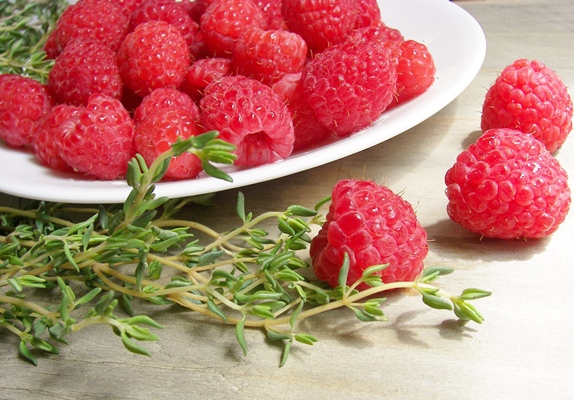
6 cups white-wine vinegar
3 cups fresh raspberries
12 sprigs fresh thyme
Step #1 – Sterilize your jars
Wash 3 pint-size (2-cup) heatproof glass canning jars (or similar containers) and their lids with hot soapy water. Rinse well with hot water. Fill a large, deep pot (such as a water bath canner) about half full with water. Place the jars upright into the pot; add enough additional water to cover by 2 inches. Bring the water to a boil; boil jars for 10 minutes. Add the lids to the pot, and then remove the pot from the heat. Let the jars and lids stay in the hot water as you prepare the flavoring and vinegar. (Keeping the jars warm minimizes breakage when filling with hot liquid.)
Step #2 – Prepare ingredients and finish
Heat vinegar in a large saucepan to a bare simmer (190°F). While the vinegar is heating thoroughly rinse raspberries and thyme with water.
Remove the jars from the water bath with a jar lifter or tongs. Divide the raspberries and thyme among the jars. Carefully divide the vinegar among the prepared jars, leaving at least 1/4-inch of space between the top of the jar and the vinegar. Remove lids from the water bath, dry with a clean towel and screw tightly onto the jars.
Store the jars in a cool, dark place, undisturbed, for 3 to 4 weeks. Strain vinegar through cheesecloth or fine sieve into another container. Discard all solids and pour the strained vinegar back into to rinsed jars or divide among sterilized decorative bottles. You can decorate with a few well-rinsed fresh sprigs of thyme and/or raspberries, if desired. (Decorative raspberries will begin to breakdown after a few weeks in the vinegar and should be removed once they begin to lose their shape and/or color.)
Refrigerate for up to 1 year.
Nutrition per serving: 3 calories; 0 g fat, 0 mg cholesterol; 0 g carbohydrates; 0 g added sugars; 0 g protein; 0 g fiber; 0 mg sodium
Click here for a printer-friendly version of this recipe.
Click here for a printer-friendly version of this blog post.
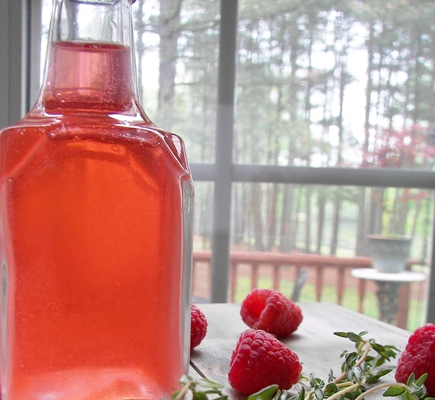
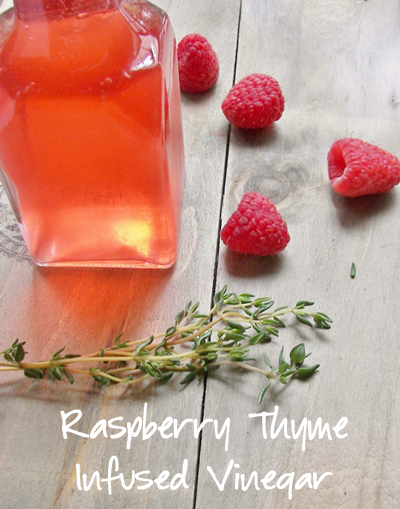
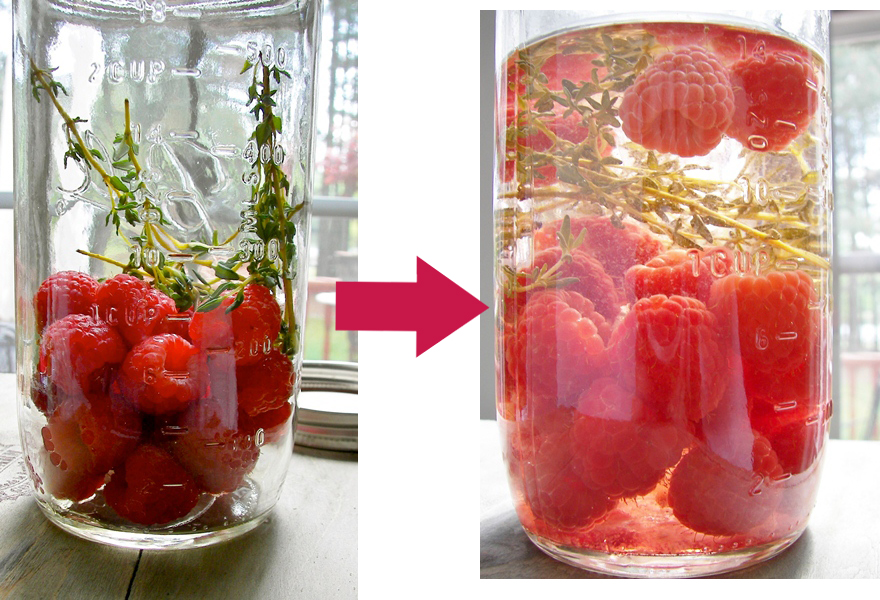
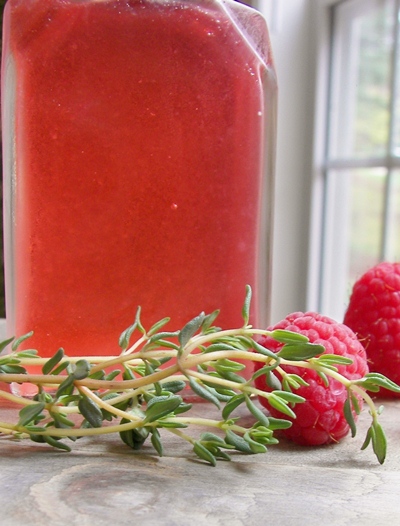


1 Comment
I just tried using Apple Cider Vinegar to calm a razor burn! Worked like a charm, I was so surprised it worked!!